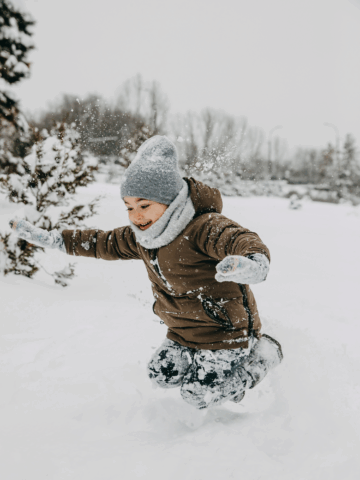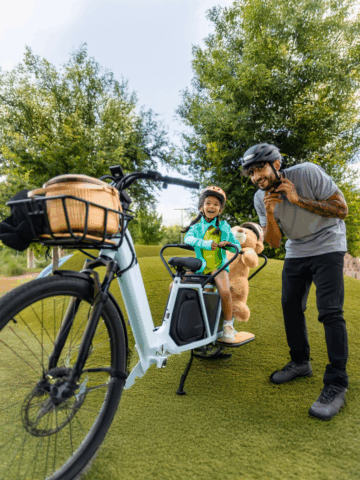Reviewed by Amy Frias, a CHOC community educator
How to keep kids safe on the Fourth of July
Celebrating the Fourth of July with kids is a joyful experience when safety comes first. Whether you’re enjoying fireworks, soaking up the sun, or taking part in water activities, being prepared helps you protect your children and enjoy the holiday with peace of mind.
Firework safety tips
The safest way to enjoy fireworks is by attending a public fireworks display conducted by trained professionals. These shows follow strict safety regulations to protect spectators and reduce risks.
If attending a public fireworks show isn’t possible—whether due to local laws (such as California’s prohibition on consumer fireworks) or other reasons—consider these safer alternatives to keep the celebration fun and secure for kids:
- Glow sticks: Bright, colorful, and completely safe. Great for nighttime fun without any fire risk.
- Noise makers: Fun and festive ways to celebrate without the danger of sparks or explosions.
- Silly string: Provides interactive entertainment and keeps kids engaged in a safe way.
- LED light toys or wands: Rechargeable and reusable. LED toys can add a festive glow without hazards.
- Organize a light show: Use flashlights or phone lights to create a family-friendly “fireworks” experience indoors or outdoors.
By choosing these alternatives, you can ensure a joyful Fourth of July celebration that keeps your children safe and worry-free.
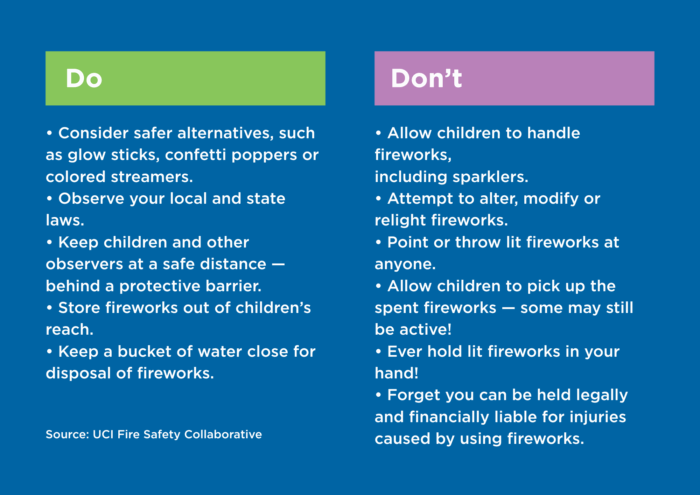
Heat safety tips
The Fourth of July often means hot weather, which can be risky for kids if they’re not careful. To keep your children safe and comfortable in the heat, follow these important heat safety tips:
- Encourage frequent hydration: Make sure kids drink plenty of water throughout the day (even if they don’t feel thirsty) to prevent dehydration. Avoid sugary or caffeinated drinks that can worsen dehydration.
- Take regular breaks indoors or in the shade: Help kids rest in cool, shaded or air-conditioned areas to avoid overheating and heat exhaustion.
- Dress appropriately: Choose lightweight, loose-fitting and light-colored clothing that helps reflect the sun and allows air to circulate.
- Use sunscreen: Apply a broad-spectrum sunscreen with at least SPF 30 and reapply every two hours or after swimming and sweating. Don’t forget hats and sunglasses to protect their faces and eyes.
- Limit intense physical activity: Encourage kids to slow down and avoid strenuous play during the hottest parts of the day, typically between 10 a.m. and 4 p.m.
- Recognize signs of heat-related illness: Watch for symptoms like dizziness, headache, excessive sweating, nausea, or fatigue, and act immediately by moving your child to a cooler place and providing water.
Water safety tips for children
Water activities are a popular part of Fourth of July celebrations, but they can come with risks. Keep your kids safe around pools, lakes, and beaches by following these water safety tips:
- Always supervise: Keep a close eye on your children near any water, including shallow or inflatable pools. Stay within arm’s reach of young kids to ensure their safety.
- Use life jackets: Make sure kids wear properly fitting U.S. Coast Guard-approved life jackets when swimming in open water or on boats.
- Set clear rules: Teach kids not to run near pools, avoid rough play in the water and swim only in designated safe areas.
- Learn swimming skills: Encourage children to take swimming lessons to build confidence and improve safety in the water.
- Be aware of water conditions: Check for hazards like strong currents, water temperature, or algae blooms before letting kids swim outdoors.
- Have a safety plan: Know where safety equipment like life rings or reaching poles are located and ensure someone present knows CPR.
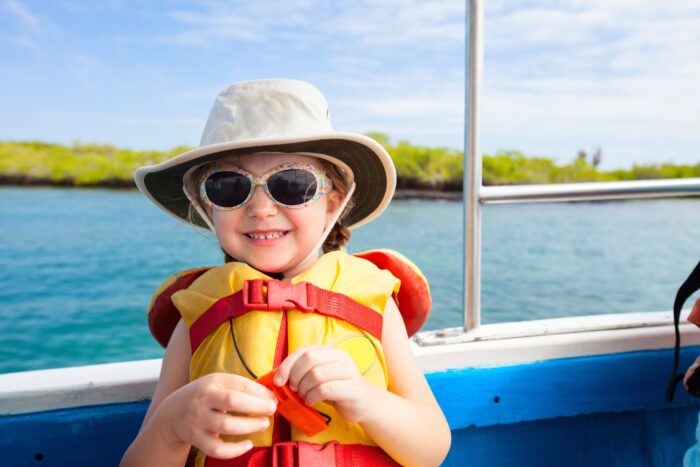
BBQ safety tips for families
Barbecues are a favorite way to celebrate the Fourth of July, but it’s important to follow safety rules to prevent burns, fires, and accidents:
- Keep kids and pets away from the grill: Set up a “kid-free zone” of at least 3 feet around the grill to prevent accidental burns.
- Use the grill outdoors in a well-ventilated area: Never grill indoors or in enclosed spaces like garages or tents.
- Supervise at all times: Adults should always be present when the grill is in use.
- Use long-handled tools and flame-resistant gloves: This helps keep hands and arms safely away from heat and flames.
- Keep a fire extinguisher nearby: Be prepared for flare-ups by having a fire extinguisher or bucket of sand close at hand.
- Turn off the grill properly: After cooking, make sure the grill is completely turned off and cool before leaving it unattended or cleaning.
First aid basics for families
Being prepared with basic first aid knowledge can make a big difference in handling minor injuries or emergencies during holiday celebrations. Here are essential first aid tips every parent should know:
- Keep a stocked first aid kit: Include bandages, antiseptic wipes, adhesive tape, tweezers, gloves and burn ointment.
- Know how to clean wounds: Gently wash cuts or scrapes with clean water and apply an antibiotic ointment to prevent infection.
- Treat minor burns: Cool burns immediately with cool (not cold) running water for at least 10 minutes, then cover with a clean, non-stick dressing.
- Recognize allergic reactions: Be alert for signs like swelling, difficulty breathing, or hives, and have an emergency action plan if your child has allergies.
- Learn CPR and emergency numbers: Taking a CPR course and knowing how to contact emergency services can save lives in critical situations.
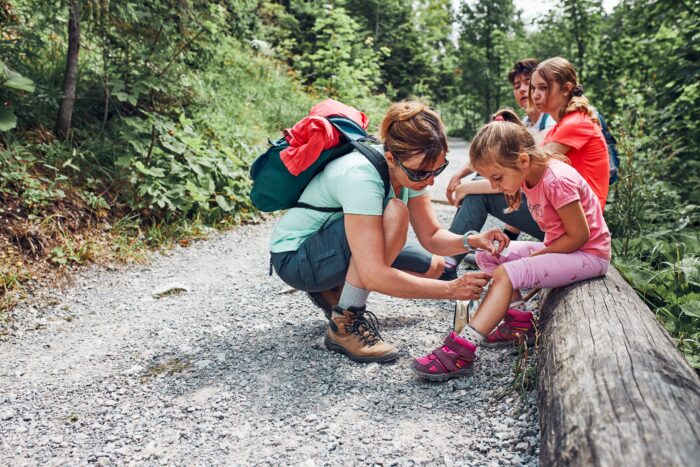
Helmet safety for kids
Wearing a helmet is one of the simplest and most effective ways to protect children from head injuries during activities like biking, skating, or riding scooters. Keep these helmet safety tips in mind:
- Always wear a properly fitting helmet: Make sure the helmet sits level on the head and the straps are snug but comfortable.
- Choose the right helmet for the activity: Different sports require different helmets—bike helmets are not interchangeable with skateboarding helmets, for example.
- Check for safety certifications: Look for helmets that meet safety standards like CPSC or ASTM to ensure proper protection.
- Replace damaged helmets: Even minor cracks can reduce a helmet’s effectiveness, so replace helmets after any significant impact.
- Encourage helmet use at all times: Set a good example and make helmet wearing a non-negotiable rule to keep kids safe.
Making Fourth of July safety for kids a priority
A fun Fourth of July with kids begins with preparation and close supervision. Using these expert tips on fireworks, heat, water and first aid can help keep your children safe and your family’s celebration enjoyable this summer.

